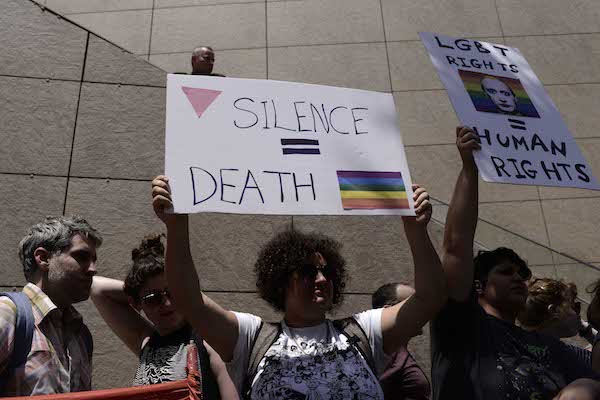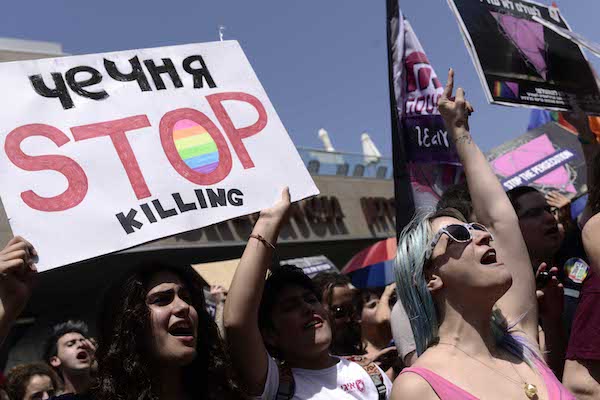Israel claims that its attitude towards the LGBT community within its borders is proof of its ‘light unto the nations’ status. So why is the government silent when LGBTs overseas are rounded up and tortured?
By Ilan Manor

One winter morning during his second tenure as British prime minister, Winston Churchill awoke to a scandal: two backbench MPs, it is said, had been caught in a homosexual act in one of London’s public parks. “Two men, in a park, in January?” Churchill wondered aloud, before adding: “Makes you proud to be British.”
Much has changed in the public perception of homosexuality since the 1950s. Nations around the world have enacted laws safeguarding the rights of LGBTs and ensured their treatment as equal members of society. In many Western countries, LGBT people can now marry, adopt children and inherit one another’s property. However, in other countries LGBT individuals still suffer from discrimination at best, and violent oppression at worst.
There is some ambiguity regarding the status of LGBTs in Israel. On the one hand, the country hosts one of the largest gay pride parades in the world which attracts thousands of tourists each year. In addition, Tel Aviv is annually ranked as one of the most LGBT-friendly cities in the world thanks to its vibrant cultural life.
On the other hand, LGBT individuals cannot get married in Israel, with only the option of a civil union available to them — a right established not with LGBTs in mind, but for those who would rather avoid a religious ceremony or who could not be married in a religious wedding. In addition, senior Israeli politicians often publicly attack the LGBT community. The current deputy speaker of the Knesset, Bezalel Smotrich of the Jewish Home Party, once organized a parade equating homosexuality with bestiality while another member of his party called on the IDF not to recruit gay soldiers. Leaders of Israeli religious parties have also expressed their disgust with LGBTs in the past.
Yet this ambiguity has never prevented Israel from using the LGBT community in its diplomatic activities. The Ministry of Tourism annually promotes the Tel Aviv pride parade while embassies the world over post photos online of LGBTs marching down the beachfront esplanade. Even the IDF publishes photos on Facebook of male soldiers walking hand in hand.

Supporters of Israel say that its treatment of LGBT people embodies the maxim “a light unto the nations.” While homosexuality is illegal throughout the Middle East, Israeli LGBTs are not only accepted but even celebrated in television, film and the theater. And while gay Palestinians are murdered due to their sexual orientation, in Israel LGBTs openly serve in the Knesset.
Nonetheless, opponents of Israel and LGBT activists and academics have accused the government of “pinkwashing” — using the LGBT community to portray the country as a defender of human rights rather than an oppressor of Palestinian rights.
Recent events have provided a unique opportunity to examine Israel’s stance on LGBT rights. For nearly a month, journalists and activists have been reporting that Chechnya has launched an unprecedented assault on LGBTs, particularly gay men and trans women. According to these reports, Chechnya’s leader, Ramzan Kadyrov, has ordered the imprisonment of gay men in concentration camps where they are tortured. Earlier this month, it was also reported that Kadyrov boasted he would eradicate Chechnya’s gay community by the following Ramadan (which starts at the end of May).
The response from the Israeli government thus far has been uniform silence. There have been no calls for an international investigation of the allegations against Chechnya’s leader, no promises to call an urgent debate in the UN and no colorful tweets from the IDF. The Israeli Ministry of Foreign Affairs, the Prime Minister’s Office and the Ministry of Tourism, which annually banks on LGBT tourists, have all failed to comment on the alleged persecution of gay people.
It is the proximity of the reports from Chechnya to Israel’s Holocaust Remembrance Day that makes Israel’s silence especially morally abhorrent. Only a week ago, in remembrance ceremonies throughout the country, Israelis vowed never to forget the lessons of the Holocaust — yet the Israeli government cannot even comment on reports suggesting that a radical leader has assembled men in concentration camps with the aim of eliminating their community.
Had Israel truly been a champion of LGBT rights, it would have at least put this issue on the international agenda, if not led an international demand for an enquiry into the possible torture of men in Chechnya. Alas, its leaders were too busy boycotting meetings with the German foreign minister.
Israel’s silence on Chechnya is deafening. Perhaps it was pinkwashing all along.
Ilan Manor is a PhD candidate at the University of Oxford.


